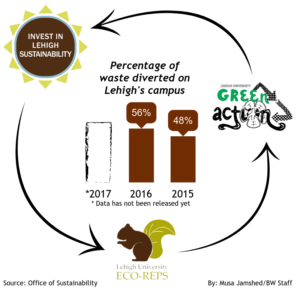 Lehigh clubs and organizations celebrated Sustainability Day on Oct. 26 to raise awareness of campus-wide efforts to reduce waste and recycle.
Lehigh clubs and organizations celebrated Sustainability Day on Oct. 26 to raise awareness of campus-wide efforts to reduce waste and recycle.
College campuses across the country host Sustainability Day in October, according to the Office of Sustainability’s website. On Lehigh’s campus, environmental groups such as Eco-Reps and Green Action help plan the day’s agenda.
Throughout the semester, the Eco-Reps host waste audits of various dormitories to measure student recycling and waste. The audits identify types and quantities of items in the waste stream.
During the audits, trash bags are weighed with a hand scale, and then items are transferred into one of four separate bags labeled trash, recycling, compost or miscellaneous. Once the bags are weighed, the Eco-Reps calculate the waste diversion rate.
On Sustainability Day, the Eco-Reps held a waste audit of the Dravo House dormitory. The results of the waste audit were displayed in a visual demonstration on the UC Front Lawn.
Green Action also works to raise environmental awareness on Lehigh’s campus. Andrew Goldman, ’19, the activism chairperson of Green Action, said the club’s largest campaign right now is fossil fuel divestment.
Goldman said the club is asking the university to withdraw around $28 million that Lehigh has invested in the fossil fuel industry and requested that the formal proposal be discussed at the next board of trustees meeting in November.
Green Action also contributes to smaller sustainability projects around campus. Goldman said the club encouraged the removal of all styrofoam products from university dining halls and put crates in the mail center so cardboard boxes can be recycled.
Goldman said it is important for students and other campus community member, to remember the actual meaning of sustainability, “a system that actively reproduces the conditions necessary for that system.”
Goldman said he thinks people often lose sight of that definition.
“I feel like that word gets watered down a lot,” he said. “It’s upsetting because it makes the word meaningless.”
For example, Goldman said using less water in the shower doesn’t solve the issue of where the water comes from. He said although using less water is certainly better, it does not meet the definition of sustainable. Something like using collected rainwater to shower, is sustainable.
“The big idea is addressing the core sources of the problems,” Goldman said, “as opposed to peripheral symptoms.”
In April 2013, Lehigh introduced its first campus sustainability plan. It included plans to divert “usable” food from trash and create a food donation program, implement electronic commerce processes and increase the amount of sustainability-related courses around campus.
In 2016, Lehigh established a new campus sustainability plan for 2020.
This plan is more rigorous and establishes both long- and short-term goals that the university wants to tackle in the next few years. The school plans to “extend the peer-to-peer” sustainability outreach program to reach 100 percent of undergraduate and graduate students by 2020 and create a lab program targeting behavioral change across all aspects of sustainability.
According to the Office of Sustainability’s website, in 2015, 1,550 Lehigh students participated in sustainability-related events and almost 10 tons of items were donated to Bethlehem’s annual Great South Side Sale.
Katharine Targett, the sustainability program manager, wrote in an email that in 2016, Lehigh’s campus diverted 56 percent of waste, an 8 percent increase from previous years. Around 399 tons of waste have been recycled and 660 tons were composted.
Other goals for 2020 include creating sustainable buildings, optimizing bus routes to curb greenhouse gases and minimizing waste by 10 percent over the 2010 baseline.
Lehigh also aims to increase sustainability through courses and research for students and faculty.
In 2015, Lehigh offered 11 undergraduate and nine graduate sustainability courses and received $10.45 million worth of grant funding for resiliency and energy research. Part of the 2020 plan is to conduct an annual sustainability literacy assessment that focuses on knowledge of sustainability topics.





Comment policy
Comments posted to The Brown and White website are reviewed by a moderator before being approved. Incendiary speech or harassing language, including comments targeted at individuals, may be deemed unacceptable and not published. Spam and other soliciting will also be declined.
The Brown and White also reserves the right to not publish entirely anonymous comments.